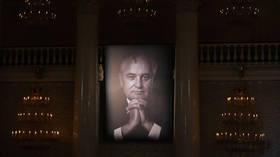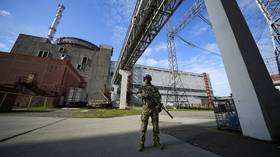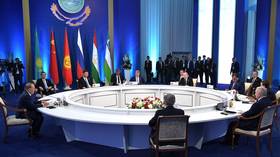Maxim Artemyev: The West took advantage of Russian weakness in the 1990s and is unable to understand the trauma it unleashed
The US-led world has forgotten at whose expense it has been getting stronger over the past 30 years. Russia is back to refresh its memory

A series of articles published in the Washington Post in August about the events leading up to Russia’s military offensive in Ukraine, and its first stage of operation, raise a significant question. How realistically and objectively do people in the West perceive the situation?
I’d like to point out several important things which often go unnoticed in the US and Europe.
The roots of the current conflict go back to the years 1985-1991, when Mikhail Gorbachev pulled the USSR out of the arms race and ended the Cold War, a move which was seen as saving the world from potential nuclear apocalypse.
As if that wasn’t enough, Gorbachev made a number of other unilateral steps which exceeded the wildest dreams of Western politicians. The Soviets withdrew from Afghanistan, agreed to tear down the Berlin Wall and allowed the reunification of Germany.
They also permitted the new country to become a member of NATO, withdrew Soviet troops from the East while allowing American troops to stay in the West, and disbanded the Warsaw Pact without a legally binding provision preventing its former members from joining the US-led military bloc.
The Soviet Union also cut its support for anti-Western forces throughout the world, from Nicaragua and Angola to Cambodia and Ethiopia. On top of that, Gorbachev did what America would not have even dared to wish for – he disbanded the USSR by carving up much of what was historical Russian territory into 15 states, thus weakening Moscow dramatically and depriving it of 50% of its pre-reforms population.
What did the new Russia, which emerged from the Soviet collapse, get in return? Simply put, nothing. There was no reciprocity. NATO remained, and the US did not give up an inch of its empire, neither letting Guam, Samoa, or Puerto Rico go, nor even returning Guantanamo to Cuba. On the contrary, the Americans used Russia’s temporary weakness to encroach on its historical territories.
Washington extended NATO membership not only to Eastern European countries which had nothing to fear (like the Czech Republic or Hungary located in the middle of Europe), but also to the Baltic states, which had been mostly under Russian control since the early 1700s. The US did not stop there, and dangled the prospect of joining NATO in front of Ukraine and Georgia. Incidentally, the homelands of the two longest serving Soviet leaders: Leonid Brezhnev and Joseph Stalin.
Since 1992, the US has been openly pursuing a policy of countering Moscow’s integration efforts in the post-Soviet space. Washington did everything it could to make sure Russia would never be reborn as a great power. And, of course, no significant financial aid was extended either to the USSR under Gorbachev or to Russia under President Boris Yeltsin, so it was a one-way street.
Let me repeat, the West got everything, Russia got nothing.
It was weakened and dismembered. However, none of the documents signed by the leaders of the US and USSR/Russia said Moscow was going to self-destruct. Back in August 1991, even George H. W. Bush, who was speaking in Kiev, called on Ukrainians not to tear the Soviet Union apart, as it was obvious to him that a step in that direction would lead to countless disasters.
It’s true that most Soviet, and then Russian, politicians of the 1980s and 1990s were not of a high caliber. There is no mistake (or act of treason – whichever you prefer) they did not commit, in the eyes of many of their countrymen. Yet their Western and, more specifically, American counterparts could have acted more civilly given Russia’s sacrifices. They could have refrained from exploiting Moscow’s temporary weakness, but instead they tried to cash in.
One should bear in mind that the USSR was not a defeated party like Japan and Germany after World War II, and did not sign any capitulation. It was under no obligation to cut itself up into 15 pieces. The collapse of historical Russia was the result of Gorbachev’s remarkably weak leadership and Yeltsin’s personal ambition, as the latter tried to consolidate power even if only over a smaller state.
Nobody was thinking about the fate of a country which had taken centuries to form or, most importantly, of its people.
Some are now saying that the dismemberment of ‘Russia’ was a key objective for the West even before 1991, and that the people of Belarus or Tajikistan were dreaming of independence all along. Such speculation sounds absolutely ridiculous to anyone who lived in the Soviet Union. Western politicians never broached the subject during their meetings with Nikita Khrushchev, Brezhnev, or Gorbachev.
Poland, currently one of the most aggressively Russophobic nations, has firsthand knowledge of the trauma of a country’s breakup. However, Warsaw was generously rewarded after World War II by Stalin, who gave it control over Silesia, East Prussia, and Pomerania.
However, nobody has compensated Russia’s losses. To put it into context, the Russian Federation today is Poland without not just Lviv, Grodno, and Vilnius, but also without Wroclaw, Szczecin, and Gdansk.
For perspective, let’s imagine that Communists led by Maurice Thorez came to power in France after 1945 (not an unlikely scenario) and divided the country into national republics – Brittany, Alsace-Lorraine, Flanders, Corsica, Occitania, etc. – as happened in Russia after 1917. Now imagine that the French Communists’ rule collapsed in 1991 and those republics became independent states. Occitania started banning French and tearing down statues of Victor Hugo to replace them with monuments to Frederic Mistral, and the government in Marseille began demanding compensation from Paris for colonial suppression and the demise of the Occitan language.
Perhaps every time Emmanuel Macron speaks in support of Ukraine, he should really be asking himself the question, what have I done for the freedom of Occitania?
History never ends. As Russia fell apart so it may become whole again. It has happened twice before – the first time in the early 1600s during the Time of Troubles, and then after the 1917 revolution. It would be wrong to assume that this process is unidirectional. Germany and Italy were reunited after a thousand years of fragmentation. It took Israel two thousand years to be reborn.
Now it has taken 30 years to reverse the trend set by the breakup of 1991. Who knows where it might lead?
The statements, views and opinions expressed in this column are solely those of the author and do not necessarily represent those of RT.
https://www.rt.com/russia/562438-what-west-forgets-when-talking/




0 Comments:
Post a Comment
Subscribe to Post Comments [Atom]
<< Home